
A legal expert explains what HR needs to know before launching a crackdown on loose tweeters

Ever had to sit an employee down for a chat about their fast and loose social media posts? If not, it might only be a matter of time.
As more and more workers pop up in the news for daft tweets and Facebook posts, it’s important for companies to ensure their own social media policies stand up to scrutiny; indeed, that they have policies to begin with.
HRD spoke to Norton Rose Fulbright associate Rebecca Liu about the best ways to avoid your company being embarrassed by staff on social media – whether intentionally, or because it can be linked back to your organization.
First off, can social media be banned at work?
The answer, says Liu, is yes – though it may not be a great business move in every instance.
“They certainly can ban it if they like, and whether or not they do it does depend on the industry - in certain industries, they want their employees to use social media because it can help them improve their brand, or certain employees are responsible for the corporate account, so that’s part of their job.”
Other employers, she says, already do have bans in place.
“If an employee’s in a safety-sensitive position, for example, where they work in warehouses or factories, more likely than not they’re banned from using their personal cellphones to access anything. It often depends on the industry, but there’s no reason why an employer who wants to ban it can’t ban it.”
She adds that the key to banning social media, or anything else at work, is having a clear policy that’s well-communicated and consistently enforced.
“If you have a great policy, and you don’t enforce it consistently, you can have a great case where someone should clearly be fired for what they did, for breaching the policy, but that termination might not stick if there’s evidence that the company doesn’t always enforce it.”
On the other hand, she says, following your employees on Twitter or sending them a Facebook friend request so you can keep an eye on them is a touch over the top.
“The other person has to accept for you to see anything, but it seems really time-intensive to do that, and often times people are posting personal things that have nothing to do with work and are probably of no interest to the employer – like, ‘look at this cute cat picture’. No one cares.”
Instead, Liu suggests monitoring mentions of your company, through search for hashtags or setting up Google alerts.
“Number one, that’s not as intrusive on the employees’ private lives, and second, it’s more efficient. Otherwise it could take, depending on how big an employer is, it could take many full-time staff to follow everybody and reading everything.”
Failing to keep an eye on those posts, she adds, can put your organization at risk, if an employee’s comments are linked back to where they work.
“There’s a reputational risk to the company if their employee is mouthing off about the company, or is making statements that we generally find offensive - that goes against the code, for example.
“The loss of confidential information is key - it’s always been a risk in the past, especially if an employee has been fired or let go, but now with social media that spreads so much quickly, it’s hard to put the toothpaste back in the container now.”
An employer could also be responsible for vicarious liability if an employee causes harm to someone else in the course of their employment, including online.
“There’s certainly good reasons for companies to think about these issues and think about how they want to address them. Social media policies are often very different - there’s no one size fits all thing. What matters is they decide on what the expectations are, and it’s clearly set out in a policy and that policy is enforced.”